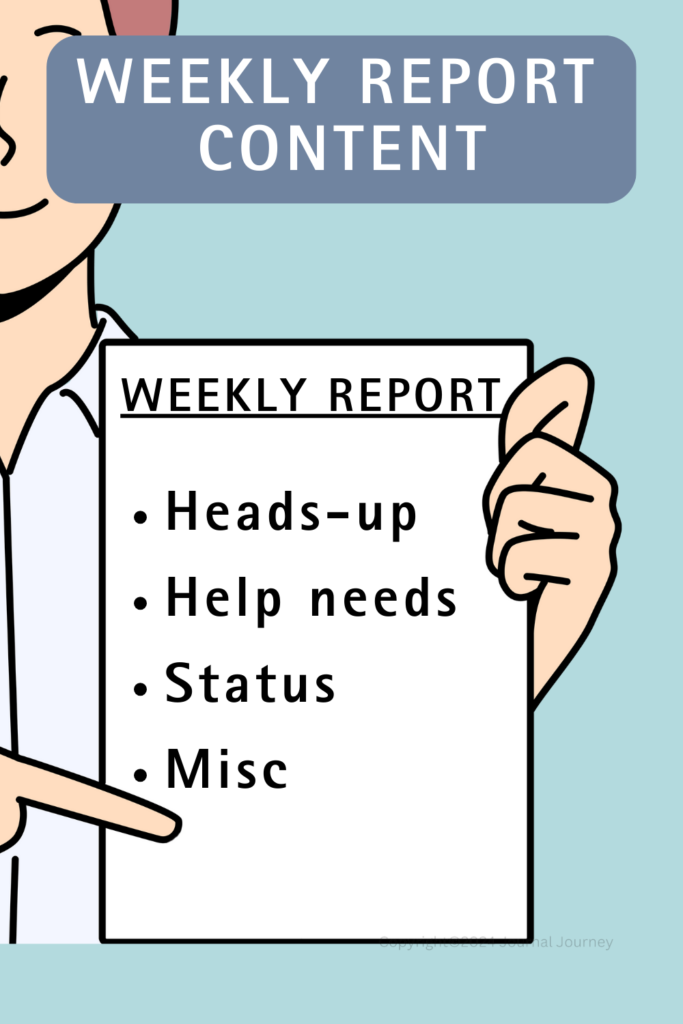
Do you submit weekly reports at your company?
As an entrepreneur or freelancer, do you conduct weekly reviews?
I’m a strong advocate for weekly reports, and I believe in submitting them proactively, even if my supervisor doesn’t explicitly require them.
I do this not only for my supervisor’s benefit but also to gain a better understanding of my own productivity.
While I haven’t held high-level positions like VP, I hope my experiences as a manager in a typical corporate setting can provide some valuable insights.
- Benefits
- Disadvantages
- Contents of the Weekly Report
- Reporting Method
- Bonus: Is it micromanagement to mandate weekly reports?
- Conclusion
- Resources
Benefits
Here are the benefits of Weekly Report
- Gain a clear understanding of your weekly performance.
- Make your supervisor understand your weekly performance.
- Build trust with your supervisor.
- Receive necessary support.
Prerequisite: A mutual understanding of the next year’s goals between you and your supervisor. Both you and your supervisor work for the same company and ultimately share the same objectives. At the beginning of each quarter, the company’s guidelines for the next year are announced. These become the overarching goals for the year. While the goals set by the CEO are often high-level, they are broken down into more specific objectives for each function, region, or project. These lower-level goals are more relevant to your day-to-day work. By aligning your personal goals with these company objectives, you’re contributing to the overall success of the organization. This alignment is crucial for receiving fair performance evaluations and for having productive discussions about any discrepancies.
Let’s explore each benefit in more detail:
1. Gain a clear understanding of your weekly performance

You can check your productivity and progress over the week.
Reviewing the week means you need to have a plan for the week. Let’s plan for the next week on Monday morning or Friday afternoon.
Now, it’s Friday afternoon…
Did you complete the tasks you planned?
By reviewing your weekly plan, you can identify tasks that were not completed and analyze the reasons behind it.
If not completed, why? There could be many reasons.
- The estimate was wrong (you thought it would take 1 hour, but it took 3 hours and still wasn’t finished).
- Distractions occurred (urgent requests from your supervisor, colleagues talking to you, fatigue affecting your concentration).
- Priorities changed, and the planned tasks’ priority decreased (a VIP customer’s issue came up, and you shuffled priority).
- The previous meeting ran long.
- Physical issues occurred (migraine, stomachache).
Analyze reason why the planned tasks weren’t completed and plan how to avoid the same issues next time, if change is needed.
Without this feedback loop, the same problems will continue to occur, and you won’t learn/grow.
How is the progress of your project?
Understand your overall progress towards project goals, even if you don’t have all the details from the start.
It’s rare to have a complete grasp of all the work for a project from the start. Unexpected incidents happen, and you need to respond flexibly. But you need to have a rough idea of where you are in the project from start to finish.
For example, if you’re creating a plan to release Product A, where are you now with the high-level information? If market research and competitor analysis are done, and you still need to consider manufacturing, development, pricing, distribution, promotion, and service, it’s 10% done. For software development, if the coding is written, you’re about 20% done. Then there’s verification, documentation, internal training, and customer training.
As you review repeatedly, you’ll get a sense of progress.
Manage progress with this sense. If you can quantify it, even better.
Reference of “Weekly Review”
– The Weekly Review
(https://todoist.com/productivity-methods/weekly-review)
– Productivity tip: How I do weekly reviews
(https://ahappyphd.org/posts/weekly-review/)
10x your productivity with just one hour a week
https://todoist.com/productivity-methods/weekly-review
2. Make your supervisor understand your weekly performance

Optimize resource allocation
Your supervisor wants to know your progress,
because they want to optimize corporate resources (people and time).
If your supervisor sees no issues in your weekly report,
they won’t respond (in my experience, this means it’s good).
If your supervisor sees some risks such as delay of the project or any risk that may cause the loss for the corporation, in your weekly report,
they will follow-up with you.
Note that they are not trying to accuse you or anything, but they just want to understand better so that they can allocate resource properly.
Provide necessary support
For instance,
After your supervisors understands the reason of project delay,
- Your supervisor might provide training opportunities for you
- Your supervisor might give you advice about the task prioritization
- Your supervisor might allocate budget for additional hiring or pull members from another team
Therefore, your weekly report is very valuable for your supervisors for optimizing resources to achieve the goals.
I’m BUSY…
Many people whine they’re busy and have no time.
But when asked how they spend their 8-hour workday, many can’t give a clear answer. As we know, the term “Busy” is highly subjective word. We cannot say “I did not complete this work because I was busy”. That is not professional.
Instead, you can show the actual invested time & its output to visualize busyness. It could be true that the task assigned to you is much bigger than your supervisor originally estimated.
Therefore, you need to track your daily/weekly activity and output. That is the weekly report for.
3. Build trust with your supervisor

Increase visibility
First, by outputting your work, you can increase the visibility of your achievements.
This has become very important recently, especially with remote work.
With limited face-to-face time and space, people might wonder what you’re doing.
Therefore, reporting your achievements in a weekly report visualizes your output and helps build trust between you and your supervisor.
Foster consensus
Next, you can reach a consensus on project progress.
Think about when your supervisor asks you to do a task.
If you don’t report anything until the task is 100% complete,
your supervisor will worry about the progress and whether it will be completed on time. The worst scenario is not having the task done by the deadline.
Therefore, report progress in your weekly report to visualize it and reach a consensus, which leads to trust.
Proactive communication
Next, let’s talk about “bad news”.
Weekly reports are not just for good news.
Reporting bad news or potential bad news that might negatively impact the business is extremely important.
Why?
Because
Reason.1 – Your supervisor is wondering if there is anything they can do to support you from their perspective.
If something bad has already happened, you can report it along with your next action in the weekly report, and execute it.
Based on that, your supervisor might give you additional help.
Or they may ask you if any help is needed.
If something bad “potentially” happens, giving a heads-up is extremetely important.
If the “bad” did NOT happen, that’s fine.
If the “bad” DID happen, your supervisor would appreciate your heads-up. Because it generates the opportunity to generate proactive solution.
Or, they may triage if they need to get invovled.
There is a big difference between
“being suddenly informed of bad news” and
“being informed of previously known bad news”.
If there is a potential issue, and if we knew it,
then we can proactively prepare the plan.B to avoid the potential issue.
Ultimately, the potential issue will no longer the issue.
Reason.2 – Your supervisor has a supervisor.
Your supervisor is responsible for your work.
(Note: Good supervisors never blame their subordinates for any bad news. If they blame you, consider changing jobs because you won’t be properly evaluated. There is nothing you can learn and grow there !)
If your supervisor does not understand the negative impact on his/her business, whether it is by you or by him/herself, it will affect his/her evaluation.
Remember, your supervisor has a supervisor.
For instance,
Depending on the severity of the bad news, bad news often bubbles up and fly in through channels other than your own professional network. (Sometimes the first news reaches upper management.)
One morning, “bad news’ flew into the VP of the department and your supervisor got suddenly asked by the VP about an issue he/she wasn’t informed, it’s problematic.
Of course, “let me quickly follow-up and will get back to you” would be a good answer.
But “Yes I am aware of the issue, and next course of action is XXXX… that has already started” is a best answer.
The transparency and proactive behavior between you and your supervisor is evident to the VP and deserves recognition.
Now you know the importance of informing the bad news to your supervisor.
4. Receive necessary help

If you encounter difficulties in your project, you can report them in your weekly report.
Busy supervisors might be away for weeks or months without live communication, or they might not respond to emails.
Therefore, including help needs in your weekly report is effective.
For your supervisor, it’s more productive to read one weekly email than to search through hundreds of emails.
Reporting help needs in your weekly report allows you to receive help effectively.
Disadvantages
The main disadvantage is that it’s tedious.
If you know of a useful digital tool for recording tasks, I encourage you to use it. (Recording activities should be as simple as possible, as analysis and review are the most important parts.)
I used to record the hours spent on each task daily in Excel and report the results as percentages for each project.
Without daily records, you can’t create a weekly report.
It’s a bit tedious, but you need records to analyze your productivity.
Contents of the Weekly Report

- Heads-up – mention this first !!
- Help needs – Report any difficulties in your project
- Project progress report
- Other achievements
- Business communication (planned vacations, etc.)
Report concisely in bullet points.
Reporting Method
You can email it with the title “WeeklyReport_FW#_YourName” and include the content in the email body.
Busy supervisors might not have time to read emails, so make the subject clear.
Keep it to the length of one PowerPoint slide (too long won’t be read).
If there’s a shared DB in the group, some might report there. (Ensure you and your supervisor is on the same page)
Bonus: Is it micromanagement to mandate weekly reports?
This is a common topic.
Some people feel that they are not trusted or micromanaged when they are required to submit weekly reports. I used to think so too.
But now I think the weekly report is for my own good.
Since I started to care about my own productivity, I make sure to do WeeklyReview on Friday afternoon or on weekends.
Some supervisors say it is not necessary, in that case, I do the WeeklyReview myself.
If the supervisor asks the subordinate to submit a WeeklyReview, it would be ideal for the supervisor to submit a WeeklyReview for the subordinate as well. If there is little change on a weekly basis, then monthly or quarterly would be fine. If the supervisor wonders what the subordinate is doing, the subordinate also wonders what the supervisor is doing. If one demands a report, he thinks he should do the same.
Conclusion
How was it? Weekly reports have many benefits, so I recommend them. Whether you’re a subordinate or a supervisor, increasing work visibility benefits both parties.
Resources
You can check other contents for your productivity enhancement.





